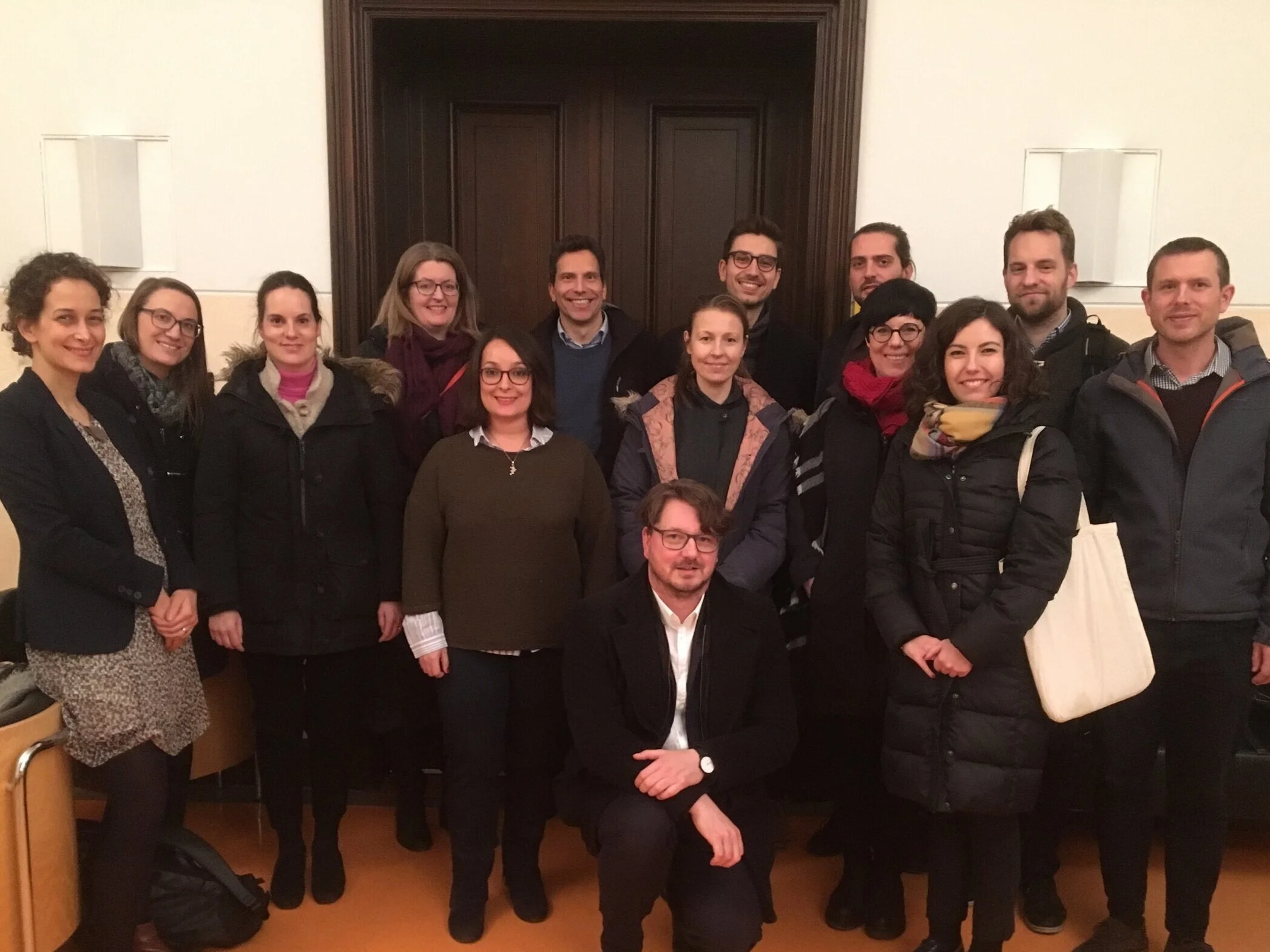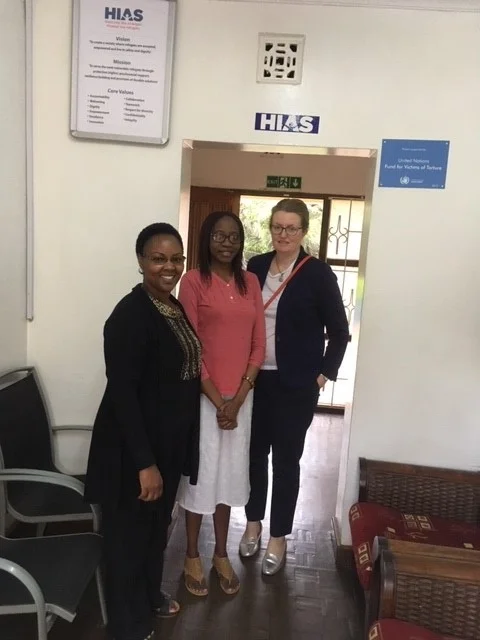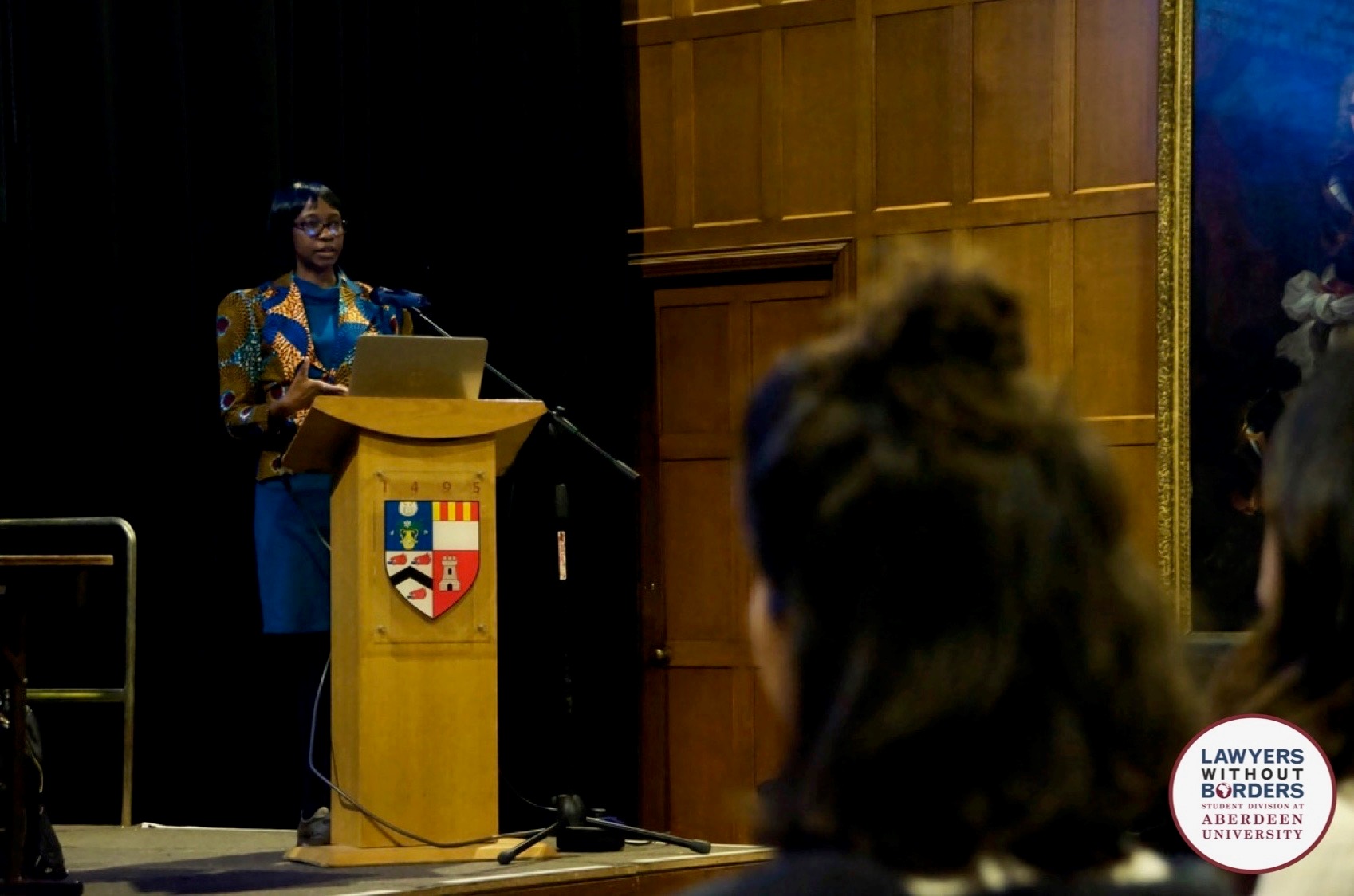Spotlight on hotspots and the new EU Migration Pact
On the release day of the Pact and in cooperation with the German Law Journal, GLJ Special Issue editors Cathryn Costello and Itamar Mann and GLJ editor Nora Markard are shining a “Spotlight on hotspots and the new EU Migration Pact“, with MEP Tineke Strik, psychiatrist Essam Daod of Humanity Crew, German journalist Isabel Schayani, Daniel Howden of Lighthouse Reports, and Minos Mouzourakis, Legal Officer at Refugee Support Aegean.
An online event facilitated by the Hertie School.
Read More
Forced Migration and Refugee Studies: Networking and Knowledge Transfer (FFVT)
A new collaborative project on migration and refugee research launched at the Centre for Human Rights Erlangen-Nürnberg (CHREN) by hosting a virtual conference’ Flucht, Governance, Menschenrechte’ on 9th-10th July 2020. Cathryn Costello was part of the panel moderated by Dr. Franck Düvell that discussed ‘The Global Compacts for Migration and on Refugees: current challenges’.
Read More
Legal Representation for Refugees - avenues available to asylum seekers in Africa
Africa hosts about 33.5% and 17.5% of the world’s refugees and asylum-seekers, respectively. The guarantee of legal aid and representation is not a right under the African Charter on Human and Peoples’ Rights which virtually all African states have ratified. However, the African Commission on Human and Peoples’ Rights that monitors the implementation of the Charter has read into it, specifically within the right to be heard, the obligation of states to provide legal aid or assistance to an accused person or a party to a civil case where the interests of justice so require. This obligation is not contained in any binding instrument but rather in non-binding guiding principles.
This short article by Caroline Nalule sets out the main ways that asylum seekers are able to access legal representation, pointing out that due to the Covid19 pandemic some of societies most vulnerable people are being left in limbo as refugee status determination processes are suspended or are operating with minimal functionality.
Read More
Human Rights of Migrants, COVID 19 and the ECHR
Governments all around the world have imposed immobility and social distancing measures as a way to combat the COVID-19 pandemic, yet responses in migration control have been highly varied. While some borders and ports are closed, and some states have halted deportations and detention, others continue to deport unwanted migrants while they import seasonal workers. What implications do the pandemic and the responses there to have for the human rights of migrants and refugees within and outside the borders of Europe? Does the European Court of Human Rights establish adequate standards to protect the human rights of migrants and refugees in the context of COVID-19? Is the CJEU affording better protection, while the ECtHR indulges states' migration control prerogatives? Watch the webinar held on 2nd June 2020 which brought together legal experts, including Cathryn Costello, to discuss the recent case law.
Read More
2020 - New links forged with the Hertie School
An exciting new collaboration begins between the Refugee Studies Centre and Hertie Institute as Professor Cathryn Costello joins Hertie to co-direct the new Centre for Fundamental Rights alongside RefMig advisory board member Professor Basak Cali. Read the announcement from the Hertie School
The launch event took place on 20/02/2020 gathering together an audience of 200 to listen to an expert panel discuss ‘Are fundamental rights losing or gaining ground?’ Find out more and listen to a podcast of the full discussion.
Read More
Migrants’ Rights and the Rule of Law
Is Europe Losing it’s Democratic Compass? This was the question that brought together a global group of legal scholars to a conference co-organised by Hasselt University and Lund University on 13th-14th February 2020. Cathryn Costello discussed the ‘Rule of Law, Authoritarian Legalism and Refugees’ in a panel on Migrants’ Rights and the Rule of Law.
See the full conference agenda
Read More
Call for Papers on Recognising Refugees
Call for articles for a Forced Migration Review special issue on 'Recognising Refugees' (Oct 2020), the aim of which is to deepen & broaden our understanding of how refugees are recognised. Deadline for submission of articles: 15 June. For more info & submission guidelines, please see the full call for papers and discuss any ideas for contributions with the FMR editorial team.
Read More
Migration policy needs an overhaul. But how?
How can migration be managed better? How can we control our borders without abusing human rights? And what countries can Europe learn from? Discussing Turkey’s migration and refugee policies Derya Ozkul joins an expert online panel, brought together by The Correspondent, to discuss alternatives to Europe’s migration policy. Follow the online discussion from 3pm on Tuesday 18th February 2020.
Read More
Introducing ASILE -Global Asylum Governance and European Union's Role
With Professor Maja Janmyr and Dr Lewis Turner, RefMig leader Cathryn Costello will be contributing to a work package in the Horizon 2020-project ASILE, coordinated by CEPS (Brussels). The project studies the interactions between emerging international protection systems and the United Nations Global Compact for Refugees (UN GCR), with particular focus on the European Union’s role and contribution. The work package – ‘Refugee Recognition, Self-reliance and Rights’ will facilitate a better understanding of how refugee protection is allocated and the rights enjoyed by refugees, as well as clarify the link between ‘refugeehood’ and the quality of refugee protection, taking work rights as an important litmus test for this protection. It will provide an in-depth comparative case study on the refugee recognition regimes in Jordan and Bangladesh.
Read More
Research into Refugee Recognition
Who is involved in the process of refugee recognition? What are the obstacles in providing protection? These questions were the starting point for an innovative workshop on Recognising Refugees held in December 2019 in Berlin, organised by RefMig and the DeZIM-Kolleg project. Themes discussed on the day were: methodological challenges, contested grounds and vulnerabilities, the role of the judiciary and the role of refugee recognition in the ‘Global South’ - the role of UNHCR. See the full workshop agenda.
Read More
Avoiding Human Rights Violations by International Organisations: Lessons from Beyond the Migration Control Context
At the invitation of ASGI (Association of Juridical Studies on Immigration), an Italian group of academics and lawyers, Cathryn Costello and Angela Sherwood remotely joined a workshop on ‘Externalization of Borders and the Role of IOM ‘ held in Rome on 5th December 2019. Cathryn discussed lessons on how international organisations can avoid human rights violations. The full workshop agenda is available here.
Read More
Syrian Refugees in Lebanon and their Wish to Return to a ‘new Syria’
As part of a workshop “Identities in Times of Conflict and Displacement. The Case of Syria” Derya Ozkul delivered a paper “Syrian Refugees in Lebanon and their Wish to Return to a ‘new Syria’” on the 29th of November at Lady Margaret Hall, University of Oxford.
Read More
Reflexivity required in the use of creative methods in forced migration studies
Researchers are increasingly using varied mediums, such as theatre and photography, to explore and capture the experience of refugees. In a short thought piece for the ESPMI network Discussion Series: Creative Methods of Dissemination in Forced Migration Research RefMig researcher Derya Ozkul reflects on the use of performance and technologies that are not part of the usual experience of communities. While seeing potential to incite new thought-provoking processes she cautions that researchers should think about how performative techniques may also negatively impact on those that are the focus of study.
Read more from the ESPMI Discussion Series: Creative Methods of Dissemination in Forced Migration Research
Read More
Call for Papers on Recognising Refugees
Call for Papers on Recognising Refugees to participate in a Workshop at the Wissenschaftszentrum Berlin für Sozialforschung on 12th December 2019.
At the workshop, scholars (at any career stage, including doctoral researchers) are invited to present work-in-progress on refugee recognition, ideally in the form of draft papers that will be circulated to all the participants in advance of the workshop. Proposals are welcome from any pertinent discipline, in particular empirical legal studies, political science and sociology. Preference will be given to papers that engage in comparative analysis across regimes, and/or develop innovative methodologies to study refugee recognition.
The call for papers is now closed.
Read More
Recognising Refugees fieldwork 2019
Our comparative fieldwork will highlight the processes of Refugee Status Determination in a number of countries. To contextualise pressing issues our research team are meeting a number of key informants including representatives from regional bodies, non-governmental organisations and refugee-led community organisations. Read more about our fieldwork activities here.
Read More
Refugees' Right to Work – Why so Elusive?
Cathryn Costello discussed ‘Refugees’ Right to Work - Why so Elusive? at the Wissenschaftszentrum Berlin für Sozialforschung (WZB) in Berlin on 26 September 2019, 5 to 7 pm
This lecture is part of the DeZIM Kolleg project, coordinated by the Institute for Migration Research and Intercultural Studies (IMIS), University of Osnabrück for the German Center for Integration and Migration Research – DeZIM Research Community.
Read More
Migration in Africa: Law Challenges and Prospects
Dr Caroline Nalule delivered a talk on ‘Migration in Africa: Challenges and Prospects’ at the Faculty of Law, Lund University in May 2019.
Read More
Opportunity to join the RefMig team
We are seeking an experienced postdoctoral researcher to undertake desk-based and field-based research into the role of international organisations and other non-state actors in global refugee and migration regimes, empirical research (both qualitative and quantitative) and archival research, in order to accomplish the various project goals. As well as the preparation of research publications and presenting papers at appropriate scholarly conferences, stakeholder gatherings and other meetings. The position will be based at the Oxford Department of International Development, Queen Elizabeth House, Oxford. The post is fixed-term for 1 year. Applications by 17th July 2019.
Read More
Refugee Protection: Are refugees afforded sufficient protection under human rights law?
Dr Caroline Nalule spoke about: 'Refugees and the right to an effective remedy under international law' at the Lawyers Without Borders Student Division Human Rights Conference 2019 in Aberdeen in March 2019.
Read More
Talk by Dr Cathryn Costello: Dividing Refugees from (Other) Migrants
Cathryn Costello delivered a talk on ‘ The Global Compacts, IO Mandate Competition and Recognition Processes’ during her visit to the Norwegian Centre for Human Rights, University of Oslo in March 2019.
Read More



